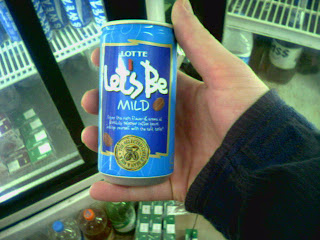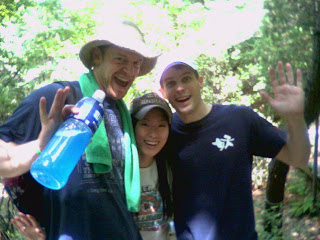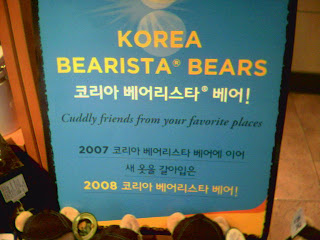mr. bojangles. One of my favourite songs.
My mouth is frozen from a dentist's appointment, and I'm sitting in the doorway of a coffee shop by Piano Street in Jongno, because it suddenly started dumping rain; it looks like it might be one of those twenty-minute showers, so I'm going to try and wait it out before I decide I need to make an umbrella-free run for my school and get a case of saggy-wet-t-shirt-itis. Blast you, Danielle, you office harpy, for talking me out of bringing my umbrella with me to Gwanjang Market for Kalkuksu. Blast you with Thor's mighty hammer. (Don't worry. She thinks it's funny when I talk to her like that. In her mind, she might well be living in a Victorian Farce.)
A few things:
I love the way the word "piss" is used in the U.K.; it's so much better than the way we NoAms use it.
North Americans use it to tell someone to go away, as a term of derision, or to mean upset:
"piss off" or "this beer tastes like piss" "that's a piss-poor excuse for skipping out on our meeting" "we were pissed off when the ticket prices were higher at the box-office than they were advertised in the poster". It can also mean extremely drunk: "he was piss-drunk" or "we got so pissed last night"
However, the U.Keeners use it in a much more interesting way (to me -- maybe they're amused by how NoAms use the word):
Taking a piss means joking. "Are you taking a piss?"
Piss-take means a prank or joke "I read the article and started to get upset, but then I realized it was April Fool's day, and the whole story was just a big piss-take.
Take the piss out of X means teasing X, quite a lot.
I used to have a roommate who was a proper Brit, through and through, from a little town called Preston. Nice guy. Really classy.

(These are from a halloween party. They're on facebook, so he's already ok with the fact the whole internet can see these pics; however, I'm not publishing his name here. If you know it, kindly don't mention it in the comments. . .)
 Despite the pictures, I'm quite serious that Englebert was classy as anything, and one of the best roommates I've had. Top three, for sure, and one of the nicest guys to hang out with, fun as heck, until he got so drunk his legs stopped working.
Despite the pictures, I'm quite serious that Englebert was classy as anything, and one of the best roommates I've had. Top three, for sure, and one of the nicest guys to hang out with, fun as heck, until he got so drunk his legs stopped working.Anyway, he had a cool way of using the English language that was different than we Canadians. Once, our friend was sick, and he said, "Oh, she's a bit gentle today," which I liked.
(this Canuckistani accent is a bit more Prairie than Vancouver, but it'll have to do).
Anyway, one day, a student invited me to his house for lunch, and during lunch, I talked about my cooking ability: I cook a few things very well, a lot of stuff alright, but the one thing I constantly bungle (bad one to bungle in Korea) is rice. I always put in too much water, or not enough, cook it too long or too short, or too hot or too cool, so it's scorched or crunchy or both. A while later, that same student teased me in class about my inability to get rice right.
Later, I was talking to my classy roomie, and my excellent Irish coworker Lorraine, and because both of them were from that region (warning: never mistake Ireland for being part of the U.K.; that's like calling Canada the fifty-first state, except with 600 years of oppression mixed in. Northern Ireland is part of the UK, but the Republic of Ireland is a sovereign state), I figured I'd try to speak in their style, you know, to show my cosmopolitan flair. Except in my excitement over using the phrase (and despite having used it properly numerous times before and since), I just right bungled it that day.
I should have said, "My student Willy really took the piss out of me today for not being able to cook rice." Would have been totally acceptable.
Instead, I said, "My student Willy took a piss on me because I can't cook rice."
(Hopefully, that three seconds of idiocy will not now undermine all my heretofore unassailed (snicker) credibility as an essayist and Korea blogger, and will be taken instead as an example of my ability to laugh at myself, a feature I consider helpful in life [see point 3].)
Back to botching idioms: that's why I tell my Korean students, "Don't waste your time learning English slang and idioms well enough to use them -- increase your vocabulary instead." Using slang and idioms is high-risk, no-reward, because if you use it wrong, you look stupid, but if you use it perfectly, it fits into the conversation so seamlessly your conversation partner won't even notice you've used it. Nobody ever stops a conversation to comment, "Hey! Great saying! That was the perfect idiom for this situation!" Learn slang well enough to understand it when it's used by others, but don't waste your time trying to incorporate slang seamlessly into your lexicon. Stumbling to find the right word will bog a conversation down, more than using perfect idiom will improve it, so improve your vocabulary instead of your slang, and speak as simply as possible.
Also to my Korean readers: if you know some slang, don't twist the conversation around just so you can use the phrases you memorized. I once had a lunch with another student's mother, and she was a chatterbox, constantly apologizing for her (quite good) English (another pet peeve -- don't apologize; just talk), and twisting the conversation to lob her idioms into the chat like hand grenades.
For example:
Mom: (changing the topic out of the blue) Do you think I'm speaking politely enough?
Me: Sure. You don't have to worry about that with me.
Mom: (pounds table with open hand) LET'S NOT STAND ON CEREMONY!!!!!! (does 'look what I did!' grin, like a kid who hit a bulls-eye on her first try)
Me: Pfffft! (nearly empties mouthful of cola into lap)
High comedy.
From the Hire a Proofreader, Nimrod! files: at my own school. . .
 Drinks come in really small cans here: it's nice, sometimes, when you aren't that thirsty, and once you pop the top, you just can't stop (that's why I prefer screw-cap drink bottles: you can close it up and finish it later if you want). But the small portions are nice, too.
Drinks come in really small cans here: it's nice, sometimes, when you aren't that thirsty, and once you pop the top, you just can't stop (that's why I prefer screw-cap drink bottles: you can close it up and finish it later if you want). But the small portions are nice, too. Especially compared to North American drink sizes.
Especially compared to North American drink sizes. (from google images)
(from google images)Climbed a mountain with these people last weekend. They were really fun, and we laughed a lot.
 The starbucks had stuffed "bear-istas" you could buy, which seemed like a cool celebration of Starbucks' new international ubiquity. . .
The starbucks had stuffed "bear-istas" you could buy, which seemed like a cool celebration of Starbucks' new international ubiquity. . .
The problem was, unless the barrista uniforms they wear are totally unique to Korea, there was nothing about these bears that was Korean except the word "Korea" on the flag they held. Something about across-the-board uniformity could, doubtless be said here, but I'll leave it at this: unless the bear smelled like garlic, (Korea's origin myth involves a tiger and a bear hiding in a cave and eating only garlic for 100 days) there's really nothing Korean about it except the word on the flag.
 Went to Ganghwa Island, where seagulls follow the ferries to eat the shrimp snacks people throw at them. Boy they were fun. And I enjoyed watching them fly, because Jonathan Livingston Seagull is one of the better "read-it-in-one-sitting" books I've come across.
Went to Ganghwa Island, where seagulls follow the ferries to eat the shrimp snacks people throw at them. Boy they were fun. And I enjoyed watching them fly, because Jonathan Livingston Seagull is one of the better "read-it-in-one-sitting" books I've come across. In fact, like "Full Metal Jacket," if the second half had been anywhere near as good as the first half, it would have been on my top five books of all time. Unfortunately, the second half of JLS (starting about when Jonathan meets The Great Seagull) kind of drifts off into some weird, mystic left-field. It starts as a beautiful metaphor for the pursuit of excellence, and finishes off in some kind of messianic non-sequiteur that doesn't quite ring true to me. That said, the first forty pages or so comprise one of the most beautiful parables I've ever read, full of poetry, simple wisdom, and great seagull photography.
In fact, like "Full Metal Jacket," if the second half had been anywhere near as good as the first half, it would have been on my top five books of all time. Unfortunately, the second half of JLS (starting about when Jonathan meets The Great Seagull) kind of drifts off into some weird, mystic left-field. It starts as a beautiful metaphor for the pursuit of excellence, and finishes off in some kind of messianic non-sequiteur that doesn't quite ring true to me. That said, the first forty pages or so comprise one of the most beautiful parables I've ever read, full of poetry, simple wisdom, and great seagull photography.People were holding up chips, and the seagulls were snatching them right out of their hands.
Even this little kid go in on the action.
 It was also cool seeing one snatch a tossed chip out of the air.
It was also cool seeing one snatch a tossed chip out of the air.
All right. that's enough for now. Until I get a better camera (and maybe even after that), I've decided to set my filter a little higher, and only publish the better pictures I take, instead of just publish all the pictures I take.
Anybody out there who can recommend a reliable camera with decent battery life, that fits into a pocket? I don't mind dishing out some coin for something I can count on, and I'm not looking for anything too complex, but a few features (like that foreground focus one where you can hold the button half-way down to keep the focus, and then adjust the picture's composition before taking the picture), compact size, good battery life (girlfriendoseyo's camera is ALWAYS running out of battery life - that's why I'd prefer one that takes AA's over one that needs to be plugged in to recharge) and a big memory card would be nice. So, uh, let me know. Especially if you want me to start posting better pictures, eh?
Later, blogosphere! I need to get ready for my one year anniversary with Girlfriendoseyo now.

9 comments:
I love the explanation of how we Brits use piss :)
We use it in all teh same ways as the NA's, but we tend to use "pissed" to only mean drunk, and will use "pissed off" to mean angry. There are 2 British uses that you missed out:
Pissing down = raining (eg. My mouth is frozen from a dentist's appointment, and I'm sitting in the doorway of a coffee shop by Piano Street in Jongno, because it suddenly started pissing down;)
Pissed all over him = was superior to... (eg. I was playing playing starcraft with my mate and I pissed all over over).
thanks for filling me in. i've been corrected often enough when I make comments about someone else's culture, that I'm always on pins and needles after posting stuff like that.
take it easy, r.e.;
p.s.: your blog is fun.
I don't know about all of England, but around London they tend to say "pissing down with rain" way to easily. I LOVE the saying, but I reserve it from those days when it really is pissing down with rain.
I was caught outside on one such occasion and was completely drenched within the few seconds it took me to get out of the rain and to shelter. Now THAT is pissing down.
In Canada we are more likely to say "It's pissing outside" when the really hard rain is past and it's just coming down sporadically - sort of typical Vancouver / Wet Coast weather.
by the way: sorry about the word verification, everyone: someone was spamming my blog.
hit it on the nose, dad: in the western Canada area, pissing is kind of the state between a drizzle and a shower, where it sounds like ranting englishman and otto use pissing to mean what we'd call pouring, or where we'd pull out phrases like "buckets" and "cats and dogs"
Taking a piss means joking. "Are you taking a piss?"
No it doesn't. Taking a piss means 'going for a pee' or what us Brits more commonly call 'going for a wee'. 'Taking THE piss' means joking.
I can forgive you for this mistake as it is amazing that by just changing an article the meaning can be totally different.
I enjoy your blog.
I stand corrected. (isn't the first time)
glad you enjoy my blog, JJmountain. sorry for getting your idiom wrong; that's exactly why I tell my students to work on their vocabulary instead -- even native speakers bungle idioms (idiae?).
Mostly I just told the story so I could put up those trashy pictures of my classy ex-roommate, anyway.
A few other forehead-smacking "English is baffling" examples:
let up and let down are not opposites, neither are throw up and throw down, or big talk and small talk.
That's quite alright, I enjoy promoting the British dialect whenever I can (I train my students to say carn't not can't and bin rather than trash can).
Those are some nice examples of baffling English.
How about the baffling idiom 'you can't have your cake and eat it' - I'm sure that one wouldn't translate well.
I've added a link to your blog on my blog shooting words :)
the hardest idiom I ever had to explain was the time I casually tossed "I'm calling your bluff" into a conversation:
first, you have to explain poker
then, you have to explain betting
then you have to explain bluffing
then you have to explain calling someone's bluff: a ten minute explanation for four simple words. unreal!
glad you like my blog.
Post a Comment